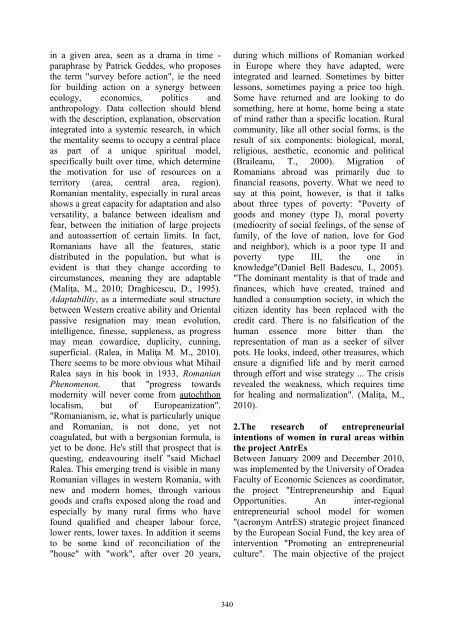Selected papers~ SPECIAL EDITION - Index of
Selected papers~ SPECIAL EDITION - Index of
Selected papers~ SPECIAL EDITION - Index of
You also want an ePaper? Increase the reach of your titles
YUMPU automatically turns print PDFs into web optimized ePapers that Google loves.
in a given area, seen as a drama in time -<br />
paraphrase by Patrick Geddes, who proposes<br />
the term "survey before action", ie the need<br />
for building action on a synergy between<br />
ecology, economics, politics and<br />
anthropology. Data collection should blend<br />
with the description, explanation, observation<br />
integrated into a systemic research, in which<br />
the mentality seems to occupy a central place<br />
as part <strong>of</strong> a unique spiritual model,<br />
specifically built over time, which determine<br />
the motivation for use <strong>of</strong> resources on a<br />
territory (area, central area, region).<br />
Romanian mentality, especially in rural areas<br />
shows a great capacity for adaptation and also<br />
versatility, a balance between idealism and<br />
fear, between the initiation <strong>of</strong> large projects<br />
and autoassertion <strong>of</strong> certain limits. In fact,<br />
Romanians have all the features, static<br />
distributed in the population, but what is<br />
evident is that they change according to<br />
circumstances, meaning they are adaptable<br />
(Maliţa, M., 2010; Draghicescu, D., 1995).<br />
Adaptability, as a intermediate soul structure<br />
between Western creative ability and Oriental<br />
passive resignation may mean evolution,<br />
intelligence, finesse, suppleness, as progress<br />
may mean cowardice, duplicity, cunning,<br />
superficial. (Ralea, in Maliţa M. M., 2010).<br />
There seems to be more obvious what Mihail<br />
Ralea says in his book in 1933, Romanian<br />
Phenomenon, that "progress towards<br />
modernity will never come from autochthon<br />
localism, but <strong>of</strong> Europeanization".<br />
"Romanianism, ie, what is particularly unique<br />
and Romanian, is not done, yet not<br />
coagulated, but with a bergsonian formula, is<br />
yet to be done. He's still that prospect that is<br />
questing, endeavouring itself "said Michael<br />
Ralea. This emerging trend is visible in many<br />
Romanian villages in western Romania, with<br />
new and modern homes, through various<br />
goods and crafts exposed along the road and<br />
especially by many rural firms who have<br />
found qualified and cheaper labour force,<br />
lower rents, lower taxes. In addition it seems<br />
to be some kind <strong>of</strong> reconciliation <strong>of</strong> the<br />
"house" with "work", after over 20 years,<br />
340<br />
during which millions <strong>of</strong> Romanian worked<br />
in Europe where they have adapted, were<br />
integrated and learned. Sometimes by bitter<br />
lessons, sometimes paying a price too high.<br />
Some have returned and are looking to do<br />
something, here at home, home being a state<br />
<strong>of</strong> mind rather than a specific location. Rural<br />
community, like all other social forms, is the<br />
result <strong>of</strong> six components: biological, moral,<br />
religious, aesthetic, economic and political<br />
(Braileanu, T., 2000). Migration <strong>of</strong><br />
Romanians abroad was primarily due to<br />
financial reasons, poverty. What we need to<br />
say at this point, however, is that it talks<br />
about three types <strong>of</strong> poverty: "Poverty <strong>of</strong><br />
goods and money (type I), moral poverty<br />
(mediocrity <strong>of</strong> social feelings, <strong>of</strong> the sense <strong>of</strong><br />
family, <strong>of</strong> the love <strong>of</strong> nation, love for God<br />
and neighbor), which is a poor type II and<br />
poverty type III, the one in<br />
knowledge"(Daniel Bell Badescu, I., 2005).<br />
"The dominant mentality is that <strong>of</strong> trade and<br />
finances, which have created, trained and<br />
handled a consumption society, in which the<br />
citizen identity has been replaced with the<br />
credit card. There is no falsification <strong>of</strong> the<br />
human essence more bitter than the<br />
representation <strong>of</strong> man as a seeker <strong>of</strong> silver<br />
pots. He looks, indeed, other treasures, which<br />
ensure a dignified life and by merit earned<br />
through effort and wise strategy ... The crisis<br />
revealed the weakness, which requires time<br />
for healing and normalization". (Maliţa, M.,<br />
2010).<br />
2.The research <strong>of</strong> entrepreneurial<br />
intentions <strong>of</strong> women in rural areas within<br />
the project AntrEs<br />
Between January 2009 and December 2010,<br />
was implemented by the University <strong>of</strong> Oradea<br />
Faculty <strong>of</strong> Economic Sciences as coordinator,<br />
the project "Entrepreneurship and Equal<br />
Opportunities. An inter-regional<br />
entrepreneurial school model for women<br />
"(acronym AntrES) strategic project financed<br />
by the European Social Fund, the key area <strong>of</strong><br />
intervention "Promoting an entrepreneurial<br />
culture". The main objective <strong>of</strong> the project


